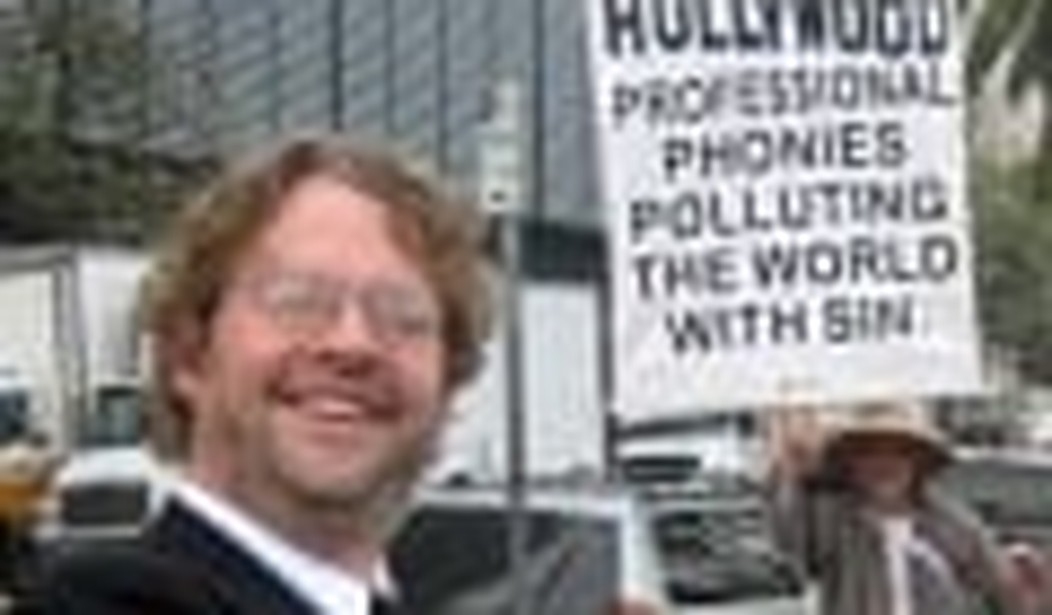Close up your laptops, ladies and gentlemen, and get out those walking shoes. The writers are on strike again in company town Los Angeles (and New York) with fourteen studio sites scheduled for picketing Monday at 8AM from Culver City to Burbank.
Entertainment journos like Nikki Finke – who is doing a great job covering the Writers’ Strike, by the way – love to call Los Angeles a “company town” for show biz the way Washington is for politics. It’s not, really. Vastly bigger than the DC metro area, LA, city and county, is a sprawling megalopolis of nearly ten million (not counting illegals) with more Koreans than any city but Seoul and more Iranians than anywhere but Tehran. Almost half that population is of Hispanic or Latino origin. Few of these people have anything even remotely to do with Hollywood. (Well, some of the Iranians do.)
Still, the last time there was a writers’ strike (1988, 22 weeks) lots of folks lost their jobs who weren’t writers – dry cleaners, restaurant workers, you name it – all the people who service the supposedly privileged of the entertainment industry. Businesses closed down that never opened again. A strike by the 12,000- member Writers’ Guild has its consequences, especially if it runs as long as the 1988 one did.
And talk on the street here is this one could be longer. The reason is “new media” – we are in the age of YouTube and no one knows where it’s headed. Movie and television execs have seen the near demise of the music industry and it has struck fear in their hearts. It should. Their power has always stemmed from controlling the means of distribution. The Internet is threatening that. Soon enough the lunatics may be running the asylum – and if you’ve seen One Flew Over The Cuckoo’s Nest, you know what that means. (Don’t worry: Jack will survive.)
For their part, the writers still smart over a negotiation a couple of decades ago when they foolishly took an incremental gain in minimums instead of a decent percentage of the videocassette royalties. At the time they thought that the home video market wasn’t all it was cracked up to be. That lame-brained decision has had tremendous ramifications in the DVD era. (Estimated DVD revenue this year is $16.4 billion.) Compared to the author of a best-selling book, a screen or television writer currently gets peanuts from the sale of a best-selling DVD. And given the notoriously devious studio accounting system, there is virtually no chance they will make it back as a percentage of profits. The studios, meanwhile, have been making out like the proverbial bandits.
And now, with any even bigger market of downloaded movies and television looming…
Wait.
Whine, whine, you’re probably saying. Why should we feel sorry for a bunch of plutocrat writers who sit around their swimming pools, downing designer sushi while typing left-wing drivel for the masses on their trendy black MacBooks? They can take their Priuses and… Well, I take your point. But I will in return point out that a solid percentage of those 12,000 WGA members work intermittently as writers at best. While not necessarily starving artists, they are far from plutocrats. Only a small group fits that tony profile and most of them are executive producers (creators) of television series, a form under serious threat by “reality shows.” For the rest, these residual profits from DVD sales and, potentially, Internet downloads could be the difference between making your mortgage or not.
Which leads to another point – who are their adversaries – “the producers”? When you read coverage of the strike, you almost always see it framed as writers vs. producers. But the latter is misleading. Most working producers couldn’t care less about the strike; in fact suffer from it. They’re unemployed too. And many writers are writer-producers (“hyphenates”) or aspire to be, particularly in television where that increases creative control and income by considerable degree. The “producers” referred to in the news coverage are the AMPTP – Alliance of Motion Picture and Television Producers. They are not producers at all in the conventional sense, but brass from the studios and companies themselves, at this juncture almost entirely giant corporations like Sony and Viacom.
This has radically changed the nature of negotiations with the studios via the AMPTP. I already saw this in action when I was a member of the WGA negotiating committee back in the early nineties – a certain corporate quality was infiltrating the process – and that state of affairs is undoubtedly more extreme now. Hollywood was indeed once a “company town” in the purer sense where most everyone knew each other or knew someone who did. When negotiations were about to break down, everyone knew to call Lew – Lew being Lew Wasserman, the one-time agent of Bette Davis and Ronald Reagan who rose through the ranks to head MCA Universal. Lew would fix things so everybody in the company town would be, if not happy, at least civil – so when they ran into each other at the Trader Vic’s bar, fistfights wouldn’t break out.
No more.
For Sony, Universal (now NBC Universal, once part of Matsushita and Vivendi), Paramount (Viacom) , Disney/ABC etc., writers, actors and directors are only a tiny part of a much larger picture. The people the WGA will be negotiating with are not principals or even friendly enemies in a company town. Far from it. They are factotums way down the corporate food chain. Lew’s world is long gone and his Universal now seems more interested in building two billion dollar theme parks in Abu Dhabi than in making movies like The Sting or American Graffiti.
So the situation is grim and the future unclear. But unfortunately for the writers, the audience will not suffer greatly, especially in the short run (unless they are late night talk show devotees – Leno and Letterman, not willing to rely on adlibs, are said to be headed for reruns.) More “reality shows” (another area of contention – the Guild says they are actually written and wants to cover them) will undoubtedly appear to make up for the lack of fictional fare.
In the long run, who can say? There’s always YouTube. Like many others, I predict a lengthy a strike. And as a writer, I am sad to say, I do not predict a Hollywood Ending.
[Watch Roger Simon’s appearance in Neil Cavuto’s show on Fox News talking about this topic here]
Roger L. Simon is an Academy Award-nominated screenwriter, novelist and blogger.









Join the conversation as a VIP Member